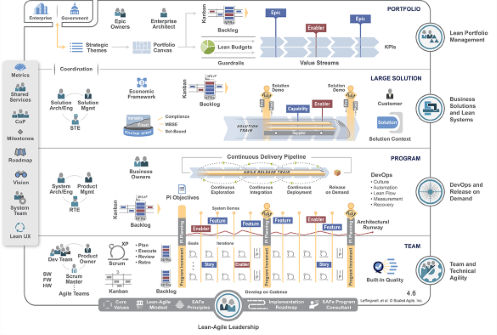Leading SAFe
During this two-day course, attendees will gain the knowledge necessary to lead a Lean-Agile enterprise by leveraging the Scaled Agile Framework® (SAFe®), and its underlying principles derived from Lean, systems thinking, Agile development, product development flow, and DevOps. They will discuss the five competencies needed to become a Lean Enterprise. They will also learn and practice the skills for supporting and executing PI Planning events, and coordinating multiple Agile Release Trains (ARTs).
Attendees will gain an understanding of the Lean-Agile mindset, why it’s so effective in today’s adapt-or-die marketplace, and what it means to lead a Lean-Agile transformation. They’ll also learn how to build and support Agile teams and programs, empower a Lean Portfolio, build a Continuous Delivery Pipeline and DevOps culture, and coordinate large solutions. They will develop a skillset that’s in demand worldwide—and empower their enterprises to succeed in a disruptive marketplace—when they become a SAFe® 4 Agilist (SA).
Attending the class prepares individuals to take the exam and become a certified SAFe® Agilist (SA) [Read More]
SAFe Product Owners/Product Managers
Develop the skillsets needed to guide the delivery of value in a Lean enterprise—and learn about the activities, tools, and mechanics used to manage backlogs and programs—by becoming a SAFe® 4 Product Owner/Product Manager (POPM). During this two-day course, attendees will gain an in-depth understanding of the Agile Release Train (ART), how it delivers value, and what they can do to effectively perform their role.
They will also learn how to apply Lean thinking to write Epics, break them down into Features and Stories, plan and execute Iterations, and plan Program Increments. Finally, attendees learn about the Continuous Delivery Pipeline and DevOps culture, how to effectively integrate as Product Owners and Product Managers, and what it takes to relentlessly improve the ART. [Read More]
SAFe Scrum Master
In this two-day course, attendees will gain an understanding of the role of a Scrum Master in a SAFe enterprise. Unlike traditional Scrum Master training that focuses on the fundamentals of team-level Scrum, the SAFe Scrum Master course explores the role of the Scrum Master in the context of the entire enterprise, and prepares attendees to successfully plan and execute the Program Increment (PI), the primary enabler of alignment throughout all levels of a SAFe organization. This includes learning the key components of Agile at scale development, how Scrum is facilitated throughout the enterprise, and how to execute Iteration Planning.
Attendees will also discover how to build high performing Agile teams by becoming a servant leader and coach, and how to coach those teams to deliver the maximum business value at scale. SAFe 4 Scrum Master (SSM) certification signifies that people are prepared to perform the role of Scrum Master in a SAFe environment, increasing their value to teams and organizations that are implementing SAFe. [Read More]
SAFe Adv Scrum Master
This two-day course prepares current Scrum Masters for their leadership role in facilitating Agile team, program, and enterprise success in a Scaled Agile Framework (SAFe®) implementation. The course covers facilitation of cross-team interactions in support of program execution and relentless improvement. It enhances the Scrum paradigm with an introduction to scalable engineering and DevOps practices; the application of Kanban to facilitate the flow of value; and supporting interactions with architects, product management, and other critical stakeholders in the larger program and enterprise contexts.
The course offers actionable tools for building high-performing teams and explores practical ways of addressing Agile and Scrum anti-patterns in the enterprise. [Read More]
SAFe DevOps
This two-day course provides a comprehensive overview for understanding the DevOps competencies needed to accelerate time-to-market by improving the flow of value through the Continuous Delivery Pipeline. Attendees will map the current value stream through their delivery pipeline from idea to cash, and identify practices that will eliminate bottlenecks to flow.
The course will build an understanding of the complete flow of value from Continuous Exploration to Continuous Integration, Continuous Deployment, and Release on Demand. Attendees will explore SAFe’s CALMR (Culture, Automation, Lean, Measure, Recover) approach to DevOps, which helps create a culture of shared responsibility for the full spectrum of Solution delivery. It helps align people, processes, and technology throughout the organization to achieve faster time-to-market.
Attendees will leave with the tools they need to execute an implementation plan for improving their delivery pipeline, and the knowledge they need to support the plan. The course also prepares students for the optional SAFe® 4 DevOps Practitioner (SDP) certification exam. [Read More]
SAFe Agile Software Engineering
The discipline of software engineering has evolved over the past decades with the introduction of Lean-Agile and DevOps principles and practices. New skills and approaches help organizations deliver software-centric solutions faster, more predictably, and with higher quality. During this three-day, workshop-oriented course, attendees learn the foundational principles and practices that make up the Agile Software Engineering discipline.
Attendees will learn how continuous flow of value delivery and building quality in are enabled by modern practices including XP technical practices, Behavioral-Driven Development (BDD), and Test-Driven Development (TDD). Attendees will learn proven practices to detail, model, design, implement, verify, and validate stories in a SAFe Continuous Delivery Pipeline. They will know the practices that build quality into code (abstraction, encapsulation, intentional programming) and designs (SOLID, Design patterns). Attendees will also understand how Software Engineering fits into the larger solution context and their role in collaborating on intentional architecture and DevOps. [Read More]
